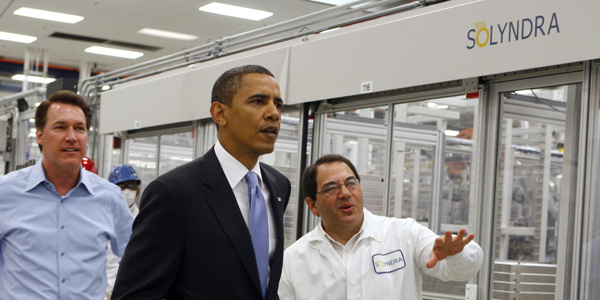The Solyndra Scandal: What It Is and Why It Matters
The controversy over a bankrupt, government-funded, solar-panel firm the White House backed, in a nutshell

The Facts: In August 2009, White House staff repeatedly asked Office of Management and Budget (OMB) officials about the status of a $535 million loan to the solar-panel manufacturer Solyndra. Last week, the company filed for bankruptcy. Two days later, the FBI raided its offices in Delaware, refusing to discuss details of the investigation.
The loan was granted by the Department of Energy (DoE) under the green-infrastructure provisions of President Obama's $787 billion stimulus bill, and OMB officials privately said they felt pressured to approve the loan prematurely. White House officials made their inquiries to OMB just weeks before Vice President Biden announced the loan at a ground-breaking ceremony in September, part of his long campaign to promote stimulus-spending projects across the country.
The Washington Post reported those facts on Tuesday after obtaining internal administration emails. The House Energy and Commerce Committee, chaired by Republican Rep. Fred Upton (Mich.), held a hearing on the Solyndra loan and the emails on Wednesday, where officials from OMB and DOE testified.
The Solyndra loan request was filed during the Bush administration, and the Bush administration had already moved forward on issuing money to Solyndra, those officials said.
The Controversy: House Republicans have alleged that the White House pressured OMB to approve the loan prematurely, despite Solyndra's financial problems. The implication is that they did so for political reasons, as the administration was rushing to promote green stimulus spending.
Why It Matters: Republicans have thrown into question the motivation behind and execution of the government's green stimulus spending, at a time when President Obama's poll numbers are sagging as he struggles to improve the economy. Early in his presidency, he promised green spending as a measure to alleviate unemployment and improve America's infrastructure. With unemployment still sitting at 9.1 percent, the Solyndra questions add even more doubts and baggage to a politically troubled program.
For environmentalists and supporters of green technology spending, the Solyndra scandal throws such spending into political danger.
If White House officials handled taxpayer dollars irresponsibly for the sake of promoting Obama's signature piece of legislation at the time, it would constitute a potential ethical lapse that resonates with criticisms against the stimulus and ballooning deficits.
What's Next: The House Energy and Commerce Committee will hold another hearing next week, where the CEO and CFO of Solyndra will likely testify, though they have not yet confirmed their appearances to the committee and a date for the hearing has not yet been set.
Image credit: AP